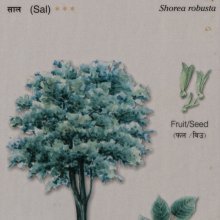Shal, Śal, Śāl, Ṣāl: 14 definitions
Introduction:
Shal means something in Hinduism, Sanskrit, the history of ancient India, biology, Tamil. If you want to know the exact meaning, history, etymology or English translation of this term then check out the descriptions on this page. Add your comment or reference to a book if you want to contribute to this summary article.
The Sanskrit terms Śal and Śāl and Ṣāl can be transliterated into English as Sal or Shal, using the IAST transliteration scheme (?).
Images (photo gallery)
In Hinduism
Vyakarana (Sanskrit grammar)
Source: Wikisource: A dictionary of Sanskrit grammarŚal (शल्).—Short term (प्रत्याहार (pratyāhāra)) for the sibilants श्,ष्, स् (ś, ṣ, s) and ह् (h); cf. शल इगुपधादनिटः क्सः (śala igupadhādaniṭaḥ ksaḥ) P.III.1.44.

Vyakarana (व्याकरण, vyākaraṇa) refers to Sanskrit grammar and represents one of the six additional sciences (vedanga) to be studied along with the Vedas. Vyakarana concerns itself with the rules of Sanskrit grammar and linguistic analysis in order to establish the correct context of words and sentences.
India history and geography
Source: Shodhganga: Deforestation in Nagaland: a historical perspectiveSal is the name of a plant corresponding to Shorea robusta, according to the author Lanukumla Ao in his thesis “Deforestation in Nagaland”, mentioning the source: Annual Administrative Report 2012-2013.
Source: Shodhganga: Vernacular architecture of Assam with special reference to Brahmaputra ValleyShal (in English “sal tree”) refers to Shorea robusta.—It appears in the study dealing with the vernacular architecture (local building construction) of Assam whose rich tradition is backed by the numerous communities and traditional cultures.

The history of India traces the identification of countries, villages, towns and other regions of India, as well as mythology, zoology, royal dynasties, rulers, tribes, local festivities and traditions and regional languages. Ancient India enjoyed religious freedom and encourages the path of Dharma, a concept common to Buddhism, Hinduism, and Jainism.
Biology (plants and animals)
Source: Wisdom Library: Local Names of Plants and DrugsSal [साल] in the Hindi language is the name of a plant identified with Shorea robusta Gaertn. from the Dipterocarpaceae (Sal) family having the following synonyms: Dryobalanops robusta. For the possible medicinal usage of sal, you can check this page for potential sources and references, although be aware that any some or none of the side-effects may not be mentioned here, wether they be harmful or beneficial to health.
Sal in the Marathi language, ibid. previous identification.
Sal in the Bengali language, ibid. previous identification.
Sal in the Assamese language, ibid. previous identification.
Source: Google Books: CRC World Dictionary (Regional names)1) Sal in India is the name of a plant defined with Oryza sativa in various botanical sources. This page contains potential references in Ayurveda, modern medicine, and other folk traditions or local practices It has the synonym Oryza sativa var. flavoacies Kara-Murza ex Zhuk. (among others).
2) Sal is also identified with Tectona grandis It has the synonym Jatus grandis Kuntze (etc.).
Example references for further research on medicinal uses or toxicity (see latin names for full list):
· Blumea, Supplement (1946)
· The Flora of British India (1896)
· Flora Brasiliensis (1871)
· Phytologia (1975)
· Indian Forester (1952)
· Revisio Generum Plantarum (1891)
If you are looking for specific details regarding Sal, for example health benefits, pregnancy safety, extract dosage, chemical composition, side effects, diet and recipes, have a look at these references.

This sections includes definitions from the five kingdoms of living things: Animals, Plants, Fungi, Protists and Monera. It will include both the official binomial nomenclature (scientific names usually in Latin) as well as regional spellings and variants.
Languages of India and abroad
Sanskrit dictionary
Source: DDSA: The practical Sanskrit-English dictionaryŚal (शल्).—I. 1 Ā. (śalate)
1) To shake, stir, agitate.
2) To tremble.
3) To cover. -II. 1 P. (śalati)
1) To go.
2) To run fast. -III. 1 Ā. (śālayate) To praise.
--- OR ---
Śāl (शाल्).—1 Ā. (śālate)
1) To praise, flatter.
2) To shine.
3) To be endowed with; Malli. on Kirātārjunīya 5.44.
4) To tell.
5) To boast, vaunt.
--- OR ---
Sal (सल्).—1 P. (salati) To go, move.
Source: Cologne Digital Sanskrit Dictionaries: Shabda-Sagara Sanskrit-English DictionaryŚal (शल्).—r. 1st cl. (śalate) 1. To move, to shake, to tremble or stir. 2. To cover. (śalati) To go, to move to or towards. r. 10th cl. (śālayati-te) To praise.
--- OR ---
Śāl (शाल्).—[(ṛ)śāḷ] r. 1st cl. (śālate) 1. To flatter, to praise. 2. To boast. 3. To tell. 4. To be endowed with.
--- OR ---
Ṣal (षल्).—r. 1st cl. (salati) 1. To go, to move. 2. To shake.
--- OR ---
Sal (सल्).—r. 1st cl. (salati) To go, to move; more properly ṣal q. v.
Source: Cologne Digital Sanskrit Dictionaries: Benfey Sanskrit-English DictionaryŚal (शल्).—i. 1, [Ātmanepada.] 1. To shake, to tremble (cf. cal). 2. To cover. i. 1, [Parasmaipada.] To go, to run. Cf. śval and śaṭh.
— With the prep. ud ud, i. 1, [Parasmaipada.] To start up, [Śiśupālavadha] 3, 37. Ptcple. of the pf. pass. ucchalita. 1. Starting up, bublling up, [Pañcatantra] i. [distich] 148. 2. Uncovered, [Vikramorvaśī, (ed. Bollensen.)] 57, 19.
— With prod pra-ud, To spirt out, [Śiśupālavadha] 2, 66.
--- OR ---
Śāl (शाल्).—see śāḍ.
--- OR ---
Sal (सल्).—i. 1, [Parasmaipada.] To go (cf. sṛ).
Source: Cologne Digital Sanskrit Dictionaries: Cappeller Sanskrit-English DictionaryŚal (शल्).—1. śalati [with] ud leap, jump, rise. — Cf. ucchalant, ucchalita.
--- OR ---
Śal (शल्).—2. an exclamation.
Source: Cologne Digital Sanskrit Dictionaries: Monier-Williams Sanskrit-English Dictionary1) Śal (शल्):—1. śal [class] 1. [Ātmanepada] śalate, ‘to shake’ or ‘to cover’ [Dhātupāṭha xiv, 19];
— [class] 1. [Parasmaipada] śalati, to go, move, [ib. xix, 13] (only found in [compound] with [preposition] cf. uc-chal, proc-chal, sam-uc-chal);
— [class] 10. [Ātmanepada] śālayate, to praise, [Dhātupāṭha xxxiii, 18; Vopadeva]
2) 2. śal onomatopoetic (an exclamation used to express anything sudden), [Atharva-veda xx, 135, 2.]
3) Śāl (शाल्):—(cf. √śāḍ, which in one sense is [varia lectio]) [class] 1. [Ātmanepada] śālate, to shine, be distinguished for or endowed with ([instrumental case]), [Siṃhāsana-dvātriṃśikā or vikramāditya-caritra, jaina recension; Śiśupāla-vadha [Scholiast or Commentator]];
— [class] 1. 10. [Ātmanepada] śālate, or śālayate, to praise, [Dhātupāṭha viii, 37];—[xxxiii, 18] ([Vopadeva])
4) Ṣal (षल्):—[from ṣaṣ] in [compound] for ṣaṣ. See ṣaḍ-akṣara, ṣaḍ-ara etc.
5) Sal (सल्):—(for sar, a form of √sṛ) [class] 1. [Parasmaipada] salati, to go, move, [Dhātupāṭha xv, 40.]
Source: Cologne Digital Sanskrit Dictionaries: Yates Sanskrit-English DictionaryṢal (षल्):—salati 1. a. To go; to shake.
[Sanskrit to German]
Sanskrit, also spelled संस्कृतम् (saṃskṛtam), is an ancient language of India commonly seen as the grandmother of the Indo-European language family (even English!). Closely allied with Prakrit and Pali, Sanskrit is more exhaustive in both grammar and terms and has the most extensive collection of literature in the world, greatly surpassing its sister-languages Greek and Latin.
Kannada-English dictionary
Source: Alar: Kannada-English corpusSal (ಸಲ್):—
1) [verb] to go or come in; to enter.
2) [verb] to move (by walk, crawling, gliding, etc.) away from or toward; to go.
3) [verb] to pass (said of time); to elapse.
4) [verb] to happen; to take place.
5) [verb] to cease to exist; to die.
6) [verb] to be or become useful.
7) [verb] to be or become possible.
8) [verb] to be accomplished, achieved, fulfilled.
9) [verb] to be or become fit, apt, appropriate, etc.
10) [verb] to be in currency, valid.
11) [verb] to be accepted or become acceptable.
12) [verb] to look beautiful, lovely.
13) [verb] to be under another’s control; to be subjugated.
14) [verb] to be subject to; to undergo or experience some action or treatment.
15) [verb] to become famous; to be renowened.
16) [verb] to follow, keep or abide by (a custom, duty, rule, etc.); to observe.
17) [verb] to be or become applicable.
18) [verb] to be absorbed, engrossed in.
19) [verb] to come to join or be joined.
20) [verb] to be got or become available.
21) [verb] to continue to be observed (as a tradition).
22) [verb] to fit in properly; to join (oneself with another) cohesively.
23) [verb] to receive, got as per the rules, regulations, eligibility, etc.
24) [verb] to blend naturally with.
25) [verb] (fig.) to manage (something against odds and unfavourable conditions).
--- OR ---
Sāl (ಸಾಲ್):—
1) [verb] to take something (esp. money) on loan.
2) [verb] to be or become sufficient.
3) [verb] to be apt, proper, appropriate.
4) [verb] to be able to.
--- OR ---
Sāl (ಸಾಲ್):—
1) [verb] to get; to have; to receive.
2) [verb] to go (to).
--- OR ---
Sāl (ಸಾಲ್):—[noun] = ಸಾಲು [salu]2.
--- OR ---
Sāl (ಸಾಲ್):—[noun] = ಸಾಲು [salu]3.
Kannada is a Dravidian language (as opposed to the Indo-European language family) mainly spoken in the southwestern region of India.
Tamil dictionary
Source: DDSA: University of Madras: Tamil LexiconṢāl (ஷால்) noun < Persn. shāl. Shawl. See சால்வை. [salvai.]
Tamil is an ancient language of India from the Dravidian family spoken by roughly 250 million people mainly in southern India and Sri Lanka.
See also (Relevant definitions)
Starts with (+479): Saladi, Salai, Salaka, Salakatankati, Salala, Salana, Salanga, Salani, Salapushpa, Salarasa, Salashringa, Salata, Salati, Salatu, Salatuka, Salava, Salavahana, Salavaka, Salavalaya, Salavana.
Ends with (+10): Aakha-shal, Abhiprakshal, Akushal, Bashal, Belashak, Bhashal, Chah-shal, Deoshal, Dheki-shal, Gopura-vashal, Jui-shal, Karykushal, Kaushal, Khushal, Kshal, Kushal, Marshal, Mashal, Mutoshal, Natshal.
Full-text (+516): Shala, Ashvakarna, Salana, Shalabhanjika, Karshya, Shalaveshta, Shalaniryasa, Salarasa, Sarjjamani, Shallaki, Shaal, Kashayi, Sureshta, Salila, Yamakasala, Salura, Shalu, Irupu, Shal parni, Camasa.
Relevant text
Search found 78 books and stories containing Shal, Śal, Sal, Śāl, Ṣal, Sāl, Ṣāl, Shaal; (plurals include: Shals, Śals, Sals, Śāls, Ṣals, Sāls, Ṣāls, Shaals). You can also click to the full overview containing English textual excerpts. Below are direct links for the most relevant articles:
Lord Hayagriva in Sanskrit Literature (by Anindita Adhikari)
History and Temples < [Chapter 6]
The Jataka tales [English], Volume 1-6 (by Robert Chalmers)
Jataka 74: Rukkhadhamma-jātaka < [Book I - Ekanipāta]
Jataka 95: Mahāsudassana-jātaka < [Book I - Ekanipāta]
Jataka 521: Tesakuṇa-jātaka < [Volume 5]
Amaravati Art in the Context of Andhra Archaeology (by Sreyashi Ray chowdhuri)
A monkey offers honey to Buddha < [Chapter 3 - Amarāvatī and the Formative Stage of the Buddhist Art]
Division of Relics < [Chapter 3 - Amarāvatī and the Formative Stage of the Buddhist Art]
Artistic Connectivity between Amarāvatī and Sri Lanka < [Chapter 5 - Impact of Amarāvatī Art]
Trishashti Shalaka Purusha Caritra (by Helen M. Johnson)
Part 23: Bharata’s omniscience < [Chapter VI]
Part 12: Sambhava’s kevala < [Chapter I - Sambhavajinacaritra]
Part 1: Mahāvīra’s omniscience < [Chapter V - Mahāvīra’s omniscience and the originating of the fourfold congregation]
A Manual of Khshnoom (by Phiroz Nasarvanji Tavaria)
Chapter I < [Part II]
Parama Samhita (English translation) (by Krishnaswami Aiyangar)
Related products





